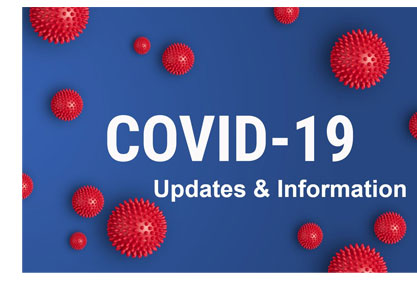THIS ISSUE'S HEADLINES
The Use of American Rescue Plan Funds Requires Wise Choices by Local Government
Rhode Island Supreme Court Favors PLDO Client – Decision Reinforces Settlor’s Intent of Testamentary Trust
Establishing Rules of Decorum in a Virtual Public Meeting World
The Ripple Effects of the Pandemic – What You Need To Know about Down-Rounds
Stay Informed – PLDO COVID-19 Resource Library

THE USE OF AMERICAN RESCUE PLAN FUNDS REQUIRES WISE CHOICES
BY LOCAL GOVERNMENT
 State and local government budgets throughout the country have been severely impacted by the COVID-19 pandemic. Government officials have been forced to make significant cuts in their budget, delay infrastructure projects, reduce spending for education and in many cases use their rainy-day funds to simply survive. State and local government budgets throughout the country have been severely impacted by the COVID-19 pandemic. Government officials have been forced to make significant cuts in their budget, delay infrastructure projects, reduce spending for education and in many cases use their rainy-day funds to simply survive.
When President Biden signed the American Rescue Plan Act of 2021 on March 11, 2021, he placed in motion a $1.9 Trillion stimulus plan as a means of stimulating the economy. The stimulus plan resources included a $350 Billion fund to assist state and local governments impacted by the COVID-19 pandemic. For many states and cities, these local funds are a lifeline and a positive jolt to the economy.
The State of Rhode Island will receive approximately $1.1 Billion in state fiscal recovery funds and local municipalities will be sharing about $542 Million. In addition, more than $415 Million is estimated for aid for K-12 education.
Government entities will receive two disbursements over the next year but will have until December 31, 2024 to use these funds to cover costs that are directly in response to the COVID-19 public health emergency or its negative economic impact.
While the American Rescue Plan will provide state and local governments with resources to stabilize their operating budgets, it is critical that government officials stay informed and act wisely. PLDO Partner Allan W. Fung has written an advisory that further details some of the provisions, restrictions and opportunities available due to the new funding resources. To access the advisory, click Local Government Must Be Cautious in Using American Rescue Plan Funds. If you would like further information about the American Rescue Plan Act or have questions about uses of the funds or other concerns, please contact Attorney Fung at 401-824-5100 or afung@pldolaw.com.
[back to top]

RHODE ISLAND SUPREME COURT FAVORS PLDO CLIENT – DECISION REINFORCES SETTLOR’S INTENT OF TESTAMENTARY TRUST
 In a recent decision of the Rhode Island Supreme Court, Cassiere v. Cassiere, No. 19-236 (March 16, 2021), the Court upheld the grant of summary judgment in favor of PLDO’s client. The matter involved the distribution of a trust established by a mother for the benefit of her two sons. The terms of the trust called for the distribution of the trust immediately upon the passing of the settlor-mother who died in 2010. The matter had been in court since that time. In a recent decision of the Rhode Island Supreme Court, Cassiere v. Cassiere, No. 19-236 (March 16, 2021), the Court upheld the grant of summary judgment in favor of PLDO’s client. The matter involved the distribution of a trust established by a mother for the benefit of her two sons. The terms of the trust called for the distribution of the trust immediately upon the passing of the settlor-mother who died in 2010. The matter had been in court since that time.
Through the efforts of PLDO attorneys, the firm’s client – the plaintiff – first prevailed on summary judgement in Superior Court on a breach of fiduciary duty counterclaim and an order for distribution of the trust funds. These decisions were appealed by the defendant to the Rhode Island Supreme Court, which upheld the judgement on all counts in favor of PLDO’s client.
Importantly as PLDO Partner Gene M. Carlino stated in a Rhode Island Lawyers Weekly article regarding the case, “The decision reinforces the cardinal rule of interpreting a testamentary instrument, and that is to effectuate the settlor’s intent. In this instance, we felt the instrument was clear and unambiguous. We are happy the state Supreme Court sustained the Superior Court’s determination that the instrument clearly required termination of the trust and distribution of our client’s share of the trust assets.”
In addition to Attorney Carlino's representation, other PLDO estate and trust attorneys and litigators representing the firm’s client included PLDO Partner Rebecca M. Murphy and Litigator Patrick J. McBurney. To read the Rhode Island Lawyers Weekly article, please click here. For further information or assistance with your estate planning matters, please contact attorneys Carlino, Murphy and McBurney at 401-824-5100 or email gcarlino@pldolaw.com, rmurphy@pldolaw.com or pmcburney@pldolaw.com.
[back to top]

ESTABLISHING RULES OF DECORUM IN A VIRTUAL PUBLIC MEETING WORLD
 Prior to the introduction of a virtual world caused by the COVID-19 pandemic, if you witnessed a city councilor popping open a beer, drinking it and then eating dinner while the council meeting was in session, your reaction likely would be bewilderment and outrage, and lead you to believe that the councilmember simply did not care enough to pay attention to you, or even worse, was impaired while doing official business. Prior to the introduction of a virtual world caused by the COVID-19 pandemic, if you witnessed a city councilor popping open a beer, drinking it and then eating dinner while the council meeting was in session, your reaction likely would be bewilderment and outrage, and lead you to believe that the councilmember simply did not care enough to pay attention to you, or even worse, was impaired while doing official business.
No doubt, technology has been a great tool to allow public officials to hold vital meetings remotely so that important work can be performed. However, as officials and employees turn on their video cameras from their living room couches, home offices, and kitchen tables, we’ve seen the atmosphere get more casual and relaxed and numerous incidents have arisen across the country where council or board members, public employees and even attendees have not only subbed their business wear for jeans, sweaters, or even t-shirts but also taken more extreme liberties and been caught drinking alcohol or eating while the meeting is occurring.
Unfortunately, when expectations are not clearly delineated as to what is appropriate or what constitutes a clear violation of workplace rules, there can be confusion when it comes to disciplinary action. In his advisory, Establishing Rules Of Decorum In A Virtual Public Meeting World, PLDO Partner Allan W. Fung provides guidance and solutions for city and town officials to maintain proper protocols for virtual meetings and explains why setting clear policies and practices are essential. For counsel and assistance in setting policies and procedures for virtual meetings, please contact Attorney Fung at 401-824-5100 or afung@pldolaw.com.
[back to top]

THE RIPPLE EFFECTS OF THE PANDEMIC – WHAT YOU NEED TO KNOW
ABOUT DOWN-ROUNDS
 It is fair to say that the effects of the COVID-19 pandemic have been profound. It has adversely impacted businesses of all sizes around the world, though sometimes disproportionately in the case of certain industries and smaller and mid-sized privately-held companies. In general, the pandemic has resulted in reduced revenues, supply chain and logistical problems and a host of other negative consequences. For companies that had previously attracted venture capital or other forms of private equity financing to grow their businesses, the potential for so-called “down-rounds” can be added to that list. It is fair to say that the effects of the COVID-19 pandemic have been profound. It has adversely impacted businesses of all sizes around the world, though sometimes disproportionately in the case of certain industries and smaller and mid-sized privately-held companies. In general, the pandemic has resulted in reduced revenues, supply chain and logistical problems and a host of other negative consequences. For companies that had previously attracted venture capital or other forms of private equity financing to grow their businesses, the potential for so-called “down-rounds” can be added to that list.
The term “down-round” is commonly used to describe the sale of a company’s stock, LLC interests or other equity securities at a price per share that is lower than the price at which the company had previously sold shares to earlier investors. Companies seeking additional equity financing try to avoid down-rounds for a number of legitimate reasons as PLDO Partner William F. Miller describes in his latest business advisory, The Ripple Effects Of The Pandemic: What You Need To Know About Down-Rounds, where he also explains the two basic approaches to anti-dilution protection referred to as “Full Ratchet” and “Weighted Average” protection provisions. To read the advisory, click the link above or here. If you would like further information about down-rounds to make informed decisions or other business matters important to you, please contact Attorney Miller at 508-420-7159 or email wmiller@pldolaw.com.
[back to top]

STAY INFORMED – PLDO COVID-19 RESOURCE LIBRARY
 PLDO’s team of attorneys continue to add updates and advisories regarding the pandemic and its impact on families, businesses and organizations that are accessible in our online Resource Library. Among the featured articles include the following: PLDO’s team of attorneys continue to add updates and advisories regarding the pandemic and its impact on families, businesses and organizations that are accessible in our online Resource Library. Among the featured articles include the following:
If you have questions and would like further information, please contact your PLDO attorney directly in our Rhode Island, Massachusetts or Florida offices or call our toll free number at 866-353-3310 to discuss your legal matter. We are here to help.
[back to top]
|




 State and local government budgets throughout the country have been severely impacted by the COVID-19 pandemic. Government officials have been forced to make significant cuts in their budget, delay infrastructure projects, reduce spending for education and in many cases use their rainy-day funds to simply survive.
State and local government budgets throughout the country have been severely impacted by the COVID-19 pandemic. Government officials have been forced to make significant cuts in their budget, delay infrastructure projects, reduce spending for education and in many cases use their rainy-day funds to simply survive. In a recent decision of the Rhode Island Supreme Court, Cassiere v. Cassiere, No. 19-236 (March 16, 2021), the Court upheld the grant of summary judgment in favor of PLDO’s client. The matter involved the distribution of a trust established by a mother for the benefit of her two sons. The terms of the trust called for the distribution of the trust immediately upon the passing of the settlor-mother who died in 2010. The matter had been in court since that time.
In a recent decision of the Rhode Island Supreme Court, Cassiere v. Cassiere, No. 19-236 (March 16, 2021), the Court upheld the grant of summary judgment in favor of PLDO’s client. The matter involved the distribution of a trust established by a mother for the benefit of her two sons. The terms of the trust called for the distribution of the trust immediately upon the passing of the settlor-mother who died in 2010. The matter had been in court since that time.  Prior to the introduction of a virtual world caused by the COVID-19 pandemic, if you witnessed a city councilor popping open a beer, drinking it and then eating dinner while the council meeting was in session, your reaction likely would be bewilderment and outrage, and lead you to believe that the councilmember simply did not care enough to pay attention to you, or even worse, was impaired while doing official business.
Prior to the introduction of a virtual world caused by the COVID-19 pandemic, if you witnessed a city councilor popping open a beer, drinking it and then eating dinner while the council meeting was in session, your reaction likely would be bewilderment and outrage, and lead you to believe that the councilmember simply did not care enough to pay attention to you, or even worse, was impaired while doing official business.  It is fair to say that the effects of the COVID-19 pandemic have been profound. It has adversely impacted businesses of all sizes around the world, though sometimes disproportionately in the case of certain industries and smaller and mid-sized privately-held companies. In general, the pandemic has resulted in reduced revenues, supply chain and logistical problems and a host of other negative consequences. For companies that had previously attracted venture capital or other forms of private equity financing to grow their businesses, the potential for so-called “down-rounds” can be added to that list.
It is fair to say that the effects of the COVID-19 pandemic have been profound. It has adversely impacted businesses of all sizes around the world, though sometimes disproportionately in the case of certain industries and smaller and mid-sized privately-held companies. In general, the pandemic has resulted in reduced revenues, supply chain and logistical problems and a host of other negative consequences. For companies that had previously attracted venture capital or other forms of private equity financing to grow their businesses, the potential for so-called “down-rounds” can be added to that list.